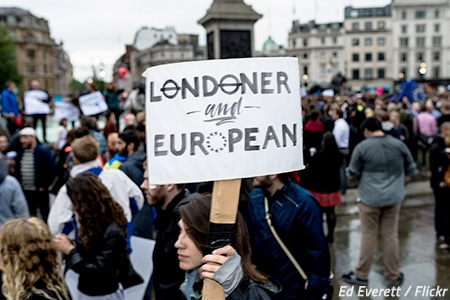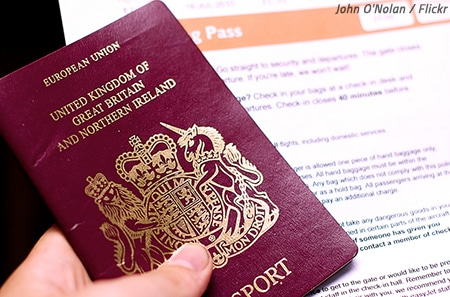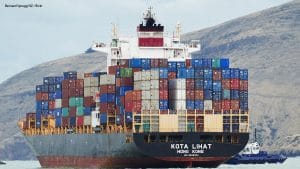 Update (September 7)
Update (September 7)
After an extensive analysis of the truly overwhelming reaction to this article, it seems like Brexiteers are marching into battle (but not to victory!) largely unchallenged, which, in all fairness, is really not fair.
Having won the EU referendum by the slightest of margins is one thing, but launching unfounded sarcastic attacks towards all young people in the UK, labelled as Remoaners, is clearly ungentlemanly.
No generation is without fault, but isn’t the UK’s young generation the one that will have to live longer with the Brexit consequences? Come on, lads and lasses, where are you? Don’t be so passive – after all, it’s your future!
Now read the original article, comment and share:
“Understand this: things are now in motion that cannot be undone.”
 While it would be unwise to question the unquestionable wisdom of the amiable yet powerful wizard, Gandalf’s words ring truer than ever now that the UK voted to leave the EU on that fateful Thursday (the 23-rd day of June, 2016).
While it would be unwise to question the unquestionable wisdom of the amiable yet powerful wizard, Gandalf’s words ring truer than ever now that the UK voted to leave the EU on that fateful Thursday (the 23-rd day of June, 2016).
Already burned in the minds of all Britons, 52% to 48% is the referendum result that will be remembered for many years to come. The rules of the game are changing too fast to be eligible for fair play, for the historic majority Leave vote will have wider implications than anyone has ever dared to predict.
Brexit! No single word in recent European history has caused such deep controversy – a white-hot dispute that showed just how greatly divided modern societies have become.
Brexit! The titanic clash between people scared of globalization and those that welcome it has successfully bred dangerously high levels of fear, xenophobia, nationalism, mistrust, and disillusionment.
Brexit! The state of limbo where everyone is quick to blame everyone else while the foreseeable future ahead looks gloomier and spookier than ever.
One thing is crystal clear: the unpredictable Brexit future will see unprecedented levels of movement as large masses of UK citizens and EU nationals will be moving in or out of the country. In fact, the Great Migration is already under way and the big Brexit question for you is, “Should I move out or can I please stay?”.
Take a sneak peek at an awesome Brexit Infographic (UK and EU: a Brexit Story) at the end of this article for some jaw-dropping statistics about the imminent exit of the UK from the European Union.
Brexit was a shocker: the domino effect
With more than 30 million British citizens casting their votes to either Leave the European Union or Remain in the EU (referendum turnout of 72.2%, see EU referendum results), the morning piece of news that the Leave campaign had won the majority of votes came as a genuine shock to the millions of Remain supporters who didn’t believe the unthinkable was possible.

And yet, it was not only possible, it was already a fact that circled the globe in a matter of hours, sending shock waves to every corner of the planet. The entire world was taken aback – after all, no state had ever left the European Union before in the bloc’s 59-year history! The initial and largely instinctive reactions like What?, But how?, and Why? could do little to change what had happened.
You must be well aware of the domino effect, right? When one event sets in motion a chain of similar events, the speed with which things are happening one after the other is simply breathtaking. Many scientists have attempted to measure the velocity of toppling dominoes (aka intrinsic angular speed of the domino cascade) but the important thing here is that once the centre of mass of the first domino is pushed past its critical angle, the rest of the dominoes will begin to fall with constant speed regardless of the initial force.
It’s debatable whether the EU referendum itself was that initial force that started the entire chain of events. Some believe that it all began as early as 22 January, 2013 when Prime Minister David Cameron gave a speech in which he said that if the Conservatives would win the next elections, they would renegotiate the UK’s relationship with the European Union. He also promised that by the end of 2017 the British people would have the “simple choice” whether to stay or leave the 28 nation bloc.
Simple, right?
On 20 February the referendum day was announced and… we all know about the immediate Brexit aftermath. Right after the national declaration of the vote results,
- David Cameron resigned as Prime Minister and the British political scene descended into a state of chaos;
- Brexit racist attacks emerged right after the outcome of the Brexit referendum, and that racial tension could reach its kindling point dangerously fast as fear of the unknown will continue to intensify;
- The decision when Article 50 – the piece of legislation that will finalize the country’s exit from the EU – would be triggered was left to Mr. Cameron’s successor;
- The Brexit effect on the pound? The value of the British pound against the US dollar fell dramatically – the UK currency lost more than 10% of its value;
- Britain lost its AAA credit rating;
- Amidst worries about the state of the economic growth, the Bank of England cut interest rates from 0.5% to 0.25%;
- Most economic sectors slowed down their run, and some even came to a halt due to the high level of uncertainty – nobody knew what was going to happen next;
- The property market slowed down its pace too, especially in the UK’s capital city. Nearly one third of all property deals in London failed or needed renegotiations right after the vote to leave the EU was announced;
- The construction industry, which makes up nearly 10% of the country’s economy, suffered its biggest downturn in the past 7 years;
- Strategic investment was put on hold over the economic uncertainty;
- A possible state of bankruptcy of the British economy due to Brexit is not out of the question in the foreseeable future.

The chain reaction doesn’t stop here. The road ahead remains unclear and it’s not too hard to predict that the Brexit-like domino cascade will not be over until the last piece falls down with a deafening thud.
What happens next: EUpocalypse or Brexageddon?
Rather than “Why did that happen?”, the question that’s burning on everyone’s mind right now is “What happens next?”. Economists and analysts alike find it very hard to predict what’s going to happen as a direct result of the referendum but most of them are unanimous that the foreseeable future of British people will not be as bright as all Vote Leave campaigners and supporters were tricked to believe.
So, which one would you rather witness – EUpocalypse or Brexageddon?
- The EU leaders demand that the UK trigger Article 50 “as soon as possible” to end the current period of hurtful uncertainty and nervous anticipation in the Union. Activation of Article 50 of the 2009 Lisbon Treaty will set in motion the unprecedented exit procedure. There are genuine worries that the actual activation of that infamous Article could lead to a state of panic as no Member State has ever done it before, and so reliable data based on previous experience can be neither compared nor analyzed.
- The pressure on the UK to determine the terms and conditions of its imminent exit from the bloc is increasing by the day as the EU leaders are positive that any unnecessary delays will only prolong the agonizing uncertainty.
-

Brexit protests all over the UK and Europe cannot undo what’s already been done. According to BBC News, both the Conservatives and the Labour party think a second referendum seems highly unlikely because it’d be “an undemocratic breach of trust with the British people who clearly voted to Leave.” Pushing the exit button won’t do any miracles – the process of quitting the European Union is not automated by any means. Rather, it’ll be a long and hard process of negotiations with the remaining member states where many new agreements, deals and special arrangements will need to be finalized before the 2 year time limit is reached.
- According to Business Insider, London will be hit the hardest in the post-Brexit economic crisis that is expected to settle in. Londoners, who voted heavily to remain in the EU, are predicted to receive the minimal benefit from the interest rate cut implemented by the Bank of England. Also, largely expected problems in the financial sector such as strategic decisions by financial firms to move away from the City will only make things more volatile and precarious.
- What about the trade terms between the UK and EU? One of the toughest aspects of the future negotiations will be the trade agreements as they will have to be approved by a large number of national and regional parliaments across the Old Continent. Failure to form new trade links with not only Europe but the rest of the world as well should bring back the World Trade Organization rules which will basically mean additional import taxes and tariffs for exporters.
- The divorce between the UK and the EU may affect adversely the pensions, investments, and mortgages of ordinary British citizens. And although it’s too soon for any specific warnings, the UK exit is believed to threaten the “triple lock” of state pensions – the guarantee that pensions will increase each year. Furthermore, bank loans and mortgages are predicted to become more expensive to repay which will put extra financial burdens on British families.
- How will Brexit impact the higher education in the UK? What will happen to the 125,000 EU students who are studying at UK universities in the moment? And what about the 43,000 university staff from various EU countries? It’s only understandable that the heads of more than 100 UK universities are “gravely concerned” about the Brexit impact on their higher education facilities and their students. After all, universities generate more than 73 billion pounds for the British economy, of which 3.7 billion pounds is generated by students from other EU countries. Here you can learn more how the higher education sector will suffer from the Brexit result.
Brexit and moving: Is the Great Migration already happening?
The shocking Brexit news that the UK is leaving the European Union automatically raises the burning issue of how the free movement of people will be handled, and just how hard Brexit will hit all expats in the country and those in the EU Member States as well.
Right now, utter confusion is the new order of the day as each and every expat is desperate to know what Brexit means for them in practice.

Expats moving direction: EU – UK
Roughly 1.3 million British people (expats) live and work in other European countries – 300,000 Britons live in Spain, 250,000 reside in Ireland, 172,000 British expats can be found in France, and 97,000 Brits live in Germany. So, what will happen to them now?
The good news here is that things will not change for British expats in other EU countries while the country is negotiating with the member states the specific terms of its exit.
The reason? Until Brexit is finalized under Article 50, Britain will still be an EU member state and so Britons will enjoy the same rights. That period of negotiations is expected to last approximately 2 years and once it’s over, things can get overly complicated in no time.
- A great number of Britons already own property in different European countries and as a result, they could suffer from unfavorable changes in property ownership, inheritance, and tax laws.
- Finding new work or keeping their old jobs could become a serious problem for British expats if some EU states introduce restrictions to work permits and starting up businesses. And if such restrictive rules should be applied, the number of Britons moving back to the UK will increase dramatically.
- What’s more, Brits may even lose their rights to work legally in the EU which could force them to apply for the EU Blue Cards – the work-and residence permits for skillful non-EU nationals.
- British expats are right to be worried because if their country failed to strike the proper deals and negotiate the necessary arrangements with the EU, they could become, at least in theory, illegal immigrants after Brexit.
- While residency and property rights may still be safe as “acquired right”, British expats’ rights to healthcare, pensions, and benefits cannot be guaranteed.
- Many British expats in other EU states rely heavily on their pensions and their major concern is whether their state pensions will be protected (up-rated annually) or whether the post-Brexit government would choose to freeze them which is what happens if a British pensioners chooses to retire to Canada, for instance.
Expats moving direction: UK – EU
According to the Office for National Statistics, around 3 million citizens from other EU countries (5% of the UK’s population!!!) are currently living and working in the UK. What will their destiny be now that the country has voted to leave the bloc?
-

Many EU nationals who live and work in the UK will be forced to experience the surreal world of the Matrix: “I can only show you the door. You’re the one that has to walk through it.” Predictions are that the millions of EU nationals living and working in the UK will likely bear the brunt of Brexit. As a start, their personal finances will be affected the most due to the decreased value of the pound (decreased spending power) and the followed general economic consequences.
- Most of all, EU nationals in the UK fear for their future as far as their rights to work are concerned. Some of them will probably have to apply for visas and work permits after Brexit – an inconvenience, to say the least, that will cost them money, time, and a score of headaches along the way.
- If some of the EU nationals fail to secure their employment, they could be forced to move out of the UK and return to their home country. The only definitive way to secure their right to remain in on the island is to apply for and receive UK citizenship.
- The possibility of post-Brexit mass deportation of EU nationals can never be ruled out, and the lack of guarantees from the government only adds to the unhealthy levels of present instability. Such worst-case scenario could affect adversely all UK employers, renters, and schools, and would wreak havoc on the housing market.
- According to a recent Brexit poll conducted by ICM Unlimited – the UK’s most respected pollster, an overwhelming majority of the British public (84%), including 77% of the ones who voted for Brexit, think that EU nationals currently residing in the UK should be allowed to stay after Brexit.
UK nationals moving direction: UK – EU
Without a doubt, the consequences of Brexit will be felt far and wide! Apparently, the UK – EU flow of people does not consist entirely of citizens from other EU countries. Many British nationals, especially young Britons, are angered by what’s happening in their own country and appear to be desperate to secure their rights to live and work on the continent. Almost all EU countries have noted a rise in British nationals requesting and applying for citizenship as the Brexit worrying signs become more and more evident.
The German Embassy in London announced that requests for German citizenship had spiked tenfold after the Brexit referendum results were announced – from an average of 20 a day to more than 200 a day. The Ireland’s embassy, as well as the Hungarian, Swedish and Polish consulates also reported an uncharacteristic rise in citizenship applications by UK nationals. It’s important to know that each country in the European Union has different requirements for gaining citizenship – read more about this burning issue here.
Hurry up – apply for an EU passport before time runs out!
-

What type of eraser will rub out EUROPEAN UNIONfrom all British passports?Germany: German Missions in the UK: Visa, Passport, ID and Consular Services
- Ireland: Embassy of Ireland in Great Britain: Citizenship and passports
- France: Consulate General of France in London: Useful information
- Sweden: Embassy of Sweden, London: United Kingdom and the EU
- Spain: Consulate of Spain in London: Information for foreigners
- Hungary: Hungary Visa Application Centres: 3 simples steps to a Hungary visa
Brexit supporters were positive that the separation of the UK from the European Union would exert greater control over the borders and would eventually help regulate the influx of migrants into the country. Ironically, as the EU principle of free movement is ticking away now, the UK borders will be stretched to their limits as masses of people have already started moving in both directions: from the UK to the EU, and from the EU to the UK /see above for details/.
How will Brexit affect the UK moving industry?
The moving industry in the United Kingdom will also be stirred up by the increasing flow of people moving in and out of the country. The need for reliable removal services, especially for top rated removal firms in London, will become dire and is expected to reach a state of frenzy in the near future. Shortage of experienced moving professionals is highly possible and that will create a different set of problems for both customers and moving service providers.
According to Tony Richman – a moving expert who has run his own removal company for 50 years (mostly specialising in European work), predicting the future of the removals and transport industry for UK operators is an impossible task – “very much like sticking your finger in the wind and predicting the weather for the next decade.” He believes that the number of moves from and to the UK will increase due to Brexit but the moving industry is likely to suffer as a direct result of the future limitations imposed on the free movement of people. The expected complexities of obtaining work permits, residence permits, rental agreements and bank guarantees will make the entire moving process overly complicated, with additional delays of hours or even days at customs clearance points.

Mr. Richman adds, “Am I personally worried about the future? Of course I am – I am a pensioner and have no idea how the future economy will pan out during my time left in this world – I am a father and a grandfather and I fear for the future prospects for my family, their jobs, their mortgages and indeed their security. I fear for the future of our nation.”
Here you can read Tony Richman’s article Will Brexit mean ‘Highway to hell’ or ‘On the sunny side of the street’ for movers?, published on themover.co.uk.
Still, one of the few silver linings is that Brexit day is not expected before the end of 2018 and the beginning of 2019 at the earliest. Remember that the two-year exit process starts after Article 50 is activated, and nobody knows yet when that activation will take place.
In the short term, there will be no change to anyone’s circumstances, so this is not the right time to think about panicking. After all, 2 years is a long time – who knows that might happen in 1,051,200 minutes!
Brexit Infographic: UK and EU: a Brexit Story

Want to have this amazing Brexit Infographic on your blog page as well? Just copy the code below and paste it on your website:
Interested in reading more about what experts are saying about Brexit?
- Why Brexit happened and what to do next by Alexander Betts, a TED talk /see the video below/
- What Brookings experts think about Brexit (read here)
- Brexit: All you need to know – the complete Brexit Guide by BBC News (read here)
- BBC News page dedicated to Brexit, Editors’ Choice (access it from here)
- Brexit and the Impact of of Immigration on the UK, Center for Economic Performance (download PDF document from here)
- Brexit and Mobility: Take action now – a complimentary whitepaper by Genie Martens, Senior Director Client Engagement and Advisory Consultant at AIRINC (download it from here)
- Brexit Timeline – Clyde&Co (see PDF document here)





Share your thoughts by leaving a comment